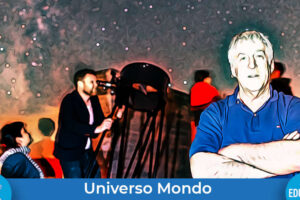Aggiornato il 28 Novembre 2024

Our guest this month is an astronomer who is deeply engaged in physics education, training the future generation of science teachers in his native Uganda, as well as researching the application of astronomical skills to advance development objectives. Tom Mutabazi is a full-time lecturer in the department of Physics at Mbarara University of Science and Technology (MUST), in the south-west part of Uganda, where he is involved in teaching and training both undergraduate and graduate students along with supervising graduate students’ research.
As usual in this series, let’s start from your path: what led you to your current position?
After my Bachelors of Science with Education degree at MUST in Uganda, I joined the University of Cape Town, South Africa, where I completed my PhD in astronomy in 2015. My research focus is in extragalactic astronomy, beyond the Milky Way, specifically in galaxy clusters and deviations of their motions from the expected Hubble flow. In 2016, I joined MUST as a full-time lecturer in the department of Physics.
Could you briefly describe for international readers what is the status of astronomy and astrophysics education in Uganda?
In Uganda, astrophysics courses are mainly taught at Mbarara University of Science and Technology but not as an independent program. Astronomy courses are taught as part of the broader program at both undergraduate and graduate levels. At undegraduate level, different astrophysics course units are introduced to students studying for a Bachelor degree of Science with Education (Physics and Mathematics combination), and also to physics majors in their final year of study.
Some of these final year students opt for astrophysics mini-research projects. At graduate level (MSc and PhD), astrophysics is well covered and many students opt for astrophysics when choosing research topics. This is partly due to funding from the International Science Program (ISP) which supports research in space science, astronomy and astrophysics at Mbarara University.

What about research: how large is the astronomical community in the country? Are there observatories or other infrastructures for astronomy research?
While the number of academics trained in astronomy- and astrophysics-related fields in Uganda is generally still small, the department of Physics at Mbarara University comprises four full-time staff who are PhD holders, one of whom is an associate professor. There are a few other PhD holders (in astronomy) offering training and teaching services in different public universities around the country.
At the moment, we do not have an observatory in the country. When needed, observations are made via research collaborations and partnerships.
What kind of research collaborations are ongoing?
There is a lot of research collaborations between Uganda and other countries in Africa (especially Rwanda, South Africa) and outside Africa (France, Germany, India, Sweden) in the form of mentorship and supervision of graduate students. These have made it possible to obtain data and also access infrastructure, such as supercomputers, when needed by our researchers. The majority of our researchers (both students and teaching staff) have benefited a lot from research visits especially to South Africa, France, and Germany.

You are personally very much engaged in science education, training secondary school science teachers and providing new tools for the school curriculum. Can you tell us more about these activities?
One of my responsibilities as a lecturer in the department of Physics at Mbarara University is to train and mentor science teachers, who study either Physics and Mathematics or Biology and Chemistry, in addition to professional courses (Foundations of Education and Psychology). After successfully completing their program, these science teachers qualify to be employed in secondary schools (both at ordinary and advanced levels) in their respective subject combinations.
In Science education, the focus is on various methods and ways to make teaching science easy and also how to motivate more girls into doing science subjects and pursue science-related courses.
In the curriculum which was reviewed recently, the focus was on how to make it more learner-centered and also include content and methods that favour remote/online learning. This was also in response to the effects of the Covid-19 pandemic which was characterised by many uncertainties and lockdowns.
How do these prospective science teachers respond to astronomy content?
The response has been positive in the last couple of years and we hope it remains so or even gets better. At the end of their program, some students prefer to do research in astrophysics, especially topics in Galactic astronomy, related to planets and planet formation.
Are there any other education and outreach projects you would like to mention?
We have had various education and outreach activities such as the Network for Astronomy School Education (NASE). Various other outreaches have been conducted, especially STEM activities, but these are not streamlined to happen or be conducted at specific times or periods since they are done only when there is funding.
We also participated in the AstroLab training at the University of Zululand, in South Africa, in 2018. Emphasis was on how to use the Las Cumbres Observatory (LCO), planning and performing real-time observations and data analysis using LCO’s robotic telescopes.

What about public outreach: how frequent are events to engage people with science, and astronomy in particular, in Uganda?
At the moment, there is not much science communication going on other than at conferences and research publications. It is however one of the things that we are planning to start doing soon.
What do you think are the major challenges for science education in your country today?
There are many challenges which are not necessarily specific to science and Uganda. The major challenge is limited resources. There is limited funding yet most of the infrastructure required to communicate and do science is usually very expensive.
There is a problem of misconceptions from the community, especially where girls are brought up with the belief, the myth that science is not for them (gender inequality). This is one of the challenges that outreach (STEM) activities in Uganda try to overcome, to solve by reaching out to communities, especially rural settings. There is also lack of mentorship, especially for those in rural, less developed remote areas where access to information is very poor.
And the biggest challenges for astronomy research and education in particular?
Lack of facilities and infrastructure: telescopes, fast computers, etc. Our research is mainly conducted using archival data or by obtaining data (observations) through research collaborations. This limits us when it comes to Big Data handling (limited facilities) and also on the other skills such as engineering (e.g. optical engineers).
Lack of infrastructure also means fewer opportunities for those who choose careers in astronomy. At the moment, majority are employed to teach in universities and other tertiary institutions in Uganda after completing their MSc or PhD. While the knowledge gap has narrowed over the years due to collaborations, there is still a problem of lack of expertise.

How do you think that astronomy can contribute ““ and is already contributing ““ to development in Uganda and more broadly on the African continent?
Due to graduate studies offered at different universities, some students have had the opportunity to successfully complete and graduate at different levels: MSc and PhD. Many of these have gotten job opportunities especially teaching in tertiary institutions and universities where they pass on the knowledge and skills.
On a special note, there is the SKA project in South Africa that has benefited many people on the African continent. Many people have been trained and still some more are being trained in different disciplines due to bursaries made available by the SKA project. The project has had a great impact on a whole spectrum of research fields, ranging from engineering to data analysis.
Development has also been registered around SKA core sites in South Africa and eight SKA partner countries ““ Namibia, Zambia, Botswana, Kenya, Ghana, Mozambique, Mauritius, and Madagascar ““ have benefited from the SKA through infrastructure development and training in radio astronomy and related technologies. Since 2015, the Developing Africa with Radio Astronomy (DARA) project and DARA Big Data project, which was set up in 2017, have trained many researchers and scientists in the eight African countries covering different aspects mainly in data science and machine learning.
Besides research and teaching, you are currently also a (remote) fellow at the International Astronomical Union’s Office of Astronomy for Development, using astronomy skills for an entirely different purpose: to explore land-use, vegetation cover and the quality of water in Uganda. Can you tell us more about this project?
As a remote fellow, I intend to use astronomy skills in analysing remote sensing data. These include generic skills like scripting and programming skills, and also more discipline-specific skills like knowledge of passbands, matching images of differing resolutions, etc. The satellite data that will be used include 250-m resolution imagery from MODIS, Enhanced Mapper Plus aboard Landsat-7, and the Multispectral Imager aboard Sentinel-2. These data will be used to study trends in land-use, vegetation cover, and water quality, with Uganda as a case study.

Many thanks for sharing these interesting perspectives on your work and more generally on astronomy research in your country. Is there anything else you would like to add?
Thank you for giving me this opportunity and chance to talk to you about the status of astronomy in Uganda. It should be noted that the positive role that astronomy is playing in Uganda is a success story of the South African Astronomical Observatory (SAAO) and the National Astrophysics and Space Science Program (NASSP). Mbarara University of Science and Technology leads in the training of graduate researchers in space science and astrophysics in Uganda due to the training offered by SAAO (around the year 2003) and the funding provided by NASSP that enabled some of my elders pursue a career in astronomy and later mentor others to this date. I am also a beneficiary of NASSP and SKA South Africa.




Add Comment